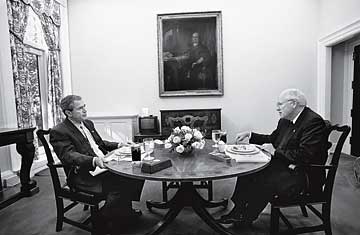
Bush and Cheney, pictured in October 2001, planned the war on terrorism but broke over whether to pardon one of its key architects
(5 of 9)
Longtime Cheney ally Donald Rumsfeld was eased out as Pentagon chief in late 2006, and Bush replaced him with Robert Gates, a former CIA director and Bush-family ally. Gates was as effective a bureaucratic player as Cheney--and much more of a pragmatist. "Bush was persuaded that the day of the neoconservatives had to be over, because the direction of his presidency had become politically unsustainable," says a well-informed adviser. "It wasn't so much a repudiation of Cheney or Cheneyism but a practical judgment that the previous approach simply wasn't working."
Cheney fought some of these initiatives all the way, "taking it upon himself," as a top adviser put it, to make the hard-line national-security case to the President. Cheney didn't lose every fight, but he was no longer winning them all either. And his backup vanished. Pentagon official Paul Wolfowitz moved to the World Bank in early 2005. Libby was indicted in October of that year and left the government. John Bolton resigned his post as U.S. ambassador to the U.N. the same month Rumsfeld left the Pentagon in 2006. Cheney's allies no longer manned the key points in the national-security flow chart. "Cheney," says an ally, "had to fight much harder to win."
The Pardon Book
The final days of the Bush White House were dominated by worries about the gasping economy, farewell interviews by senior officials and plenty of stories about Bush's dismal approval ratings as he prepared to leave town. But the "elephant in the room," as an adviser puts it, was the still unresolved case of Libby. Many in the West Wing feared that the matter threatened to rend Bush and Cheney's relationship because of the intensity of Cheney's campaign for a full and final pardon.
Bush had long approached pardons with suspicion. As Texas governor, he granted them sparingly. His reluctance stemmed not from a lack of mercy but from his sense that pardons were a rigged game, tilted in favor of offenders with political connections. "He thought the whole pardon system was completely corrupt," says a top Bush adviser. Bush had a textbook illustration in one of his predecessor's last acts: Bill Clinton's eleventh-hour pardon of fugitive financier Marc Rich, whose ex-wife had contributed heavily to his campaigns and presidential library, created a firestorm that consumed Clinton as he left the stage--and overshadowed the first days of the Bush Administration. As President, Bush was often annoyed when guests at holiday parties buttonholed him in photo lines and pleaded for pardons for friends or clients. "Talk to Fred," he'd say coolly, steering them to Fielding.
On Dec. 23, 2008, Bush announced 19 pardons. No big names. No apparent political sponsors. But one planned pardon went to a Brooklyn, N.Y., developer who had pleaded guilty in the early 2000s to lying to federal housing authorities. After news accounts surfaced that his father had given nearly $30,000 to the Republican Party earlier that year, the White House backpedaled. It didn't help that one of the lawyers who had sought the pardon had once worked in Bush's own counsel's office--exactly the kind of inside favoritism Bush despised. Bush, who had retreated to Camp David for a last family holiday, spent Christmas Eve fielding phone calls about the case. By day's end, he decided to kill the developer's pardon. The experience left him, aides say, even more wary of the process than he was before.
